Related Research Articles
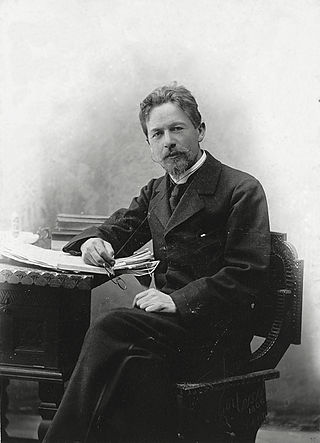
Anton Pavlovich Chekhov was a Russian playwright and short-story writer. His career as a playwright produced four classics, and his best short stories are held in high esteem by writers and critics. Along with Henrik Ibsen and August Strindberg, Chekhov is often referred to as one of the three seminal figures in the birth of early modernism in the theatre. Chekhov was a physician by profession. "Medicine is my lawful wife," he once said, "and literature is my mistress."

Thriller is a genre of fiction with numerous, often overlapping, subgenres, including crime, horror, and detective fiction. Thrillers are characterized and defined by the moods they elicit, giving their audiences heightened feelings of suspense, excitement, surprise, anticipation and anxiety. This genre is well suited to film and television.
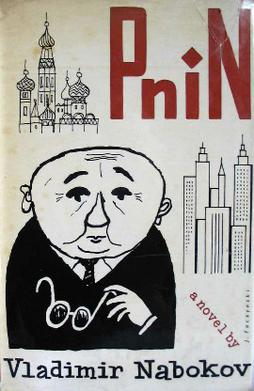
Pnin is Vladimir Nabokov's 13th novel and his fourth written in English; it was published in 1957. The success of Pnin in the United States launched Nabokov's career into literary prominence. Its eponymous protagonist, Timofey Pavlovich Pnin, is a Russian-born assistant professor in his 50s living in the United States, whose character is believed to be based partially on the life of both Nabokov's colleague Marc Szeftel as well as on Nabokov himself. Exiled by the Russian Revolution and what he calls the "Hitler war", Pnin teaches Russian at the fictional Waindell College, loosely inspired by Cornell University and Wellesley College—places where Nabokov himself taught.

The Gift is Vladimir Nabokov's final Russian novel, and is considered to be his farewell to the world he was leaving behind. Nabokov wrote it between 1935 and 1937 while living in Berlin, and it was published in serial form under his pen name, Vladimir Sirin.

Despair is the seventh novel by Vladimir Nabokov, originally published in Russian, serially in the politicized literary journal Sovremennye zapiski during 1934. It was then published as a book in 1936, and translated to English by the author in 1937. Most copies of the 1937 English edition were destroyed by German bombs during World War II; only a few copies remain. Nabokov published a second English translation in 1965; this is now the only English translation in print.
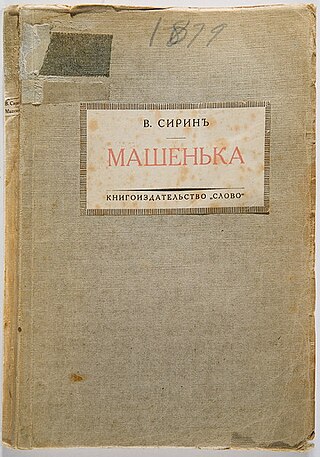
Mary is the debut novel by Vladimir Nabokov, first published under the pen name V. Sirin in 1926 by Russian-language publisher "Slovo".
The Real Life of Sebastian Knight is the first English-language novel by Vladimir Nabokov, written from late 1938 to early 1939 in Paris and first published in 1941. A work centred on language and its inability to convey any satisfactory definition, it has been identified as a forerunner of the postmodernist novel.

Leonardo Malihan Manicio, better known through his alias Nardong Putik, was a Filipino gangster who mainly operated in the province of Cavite. He famously credited his ability to survive and escape numerous ambushes and gunfights to his anting-anting (amulet).
"Razor" is a short story by the Russian writer Vladimir Nabokov. It was first published in the expatriate Russian literary magazine Rul' in 1926, but a French translation did not appear until 1991, and an English one not until 1995.
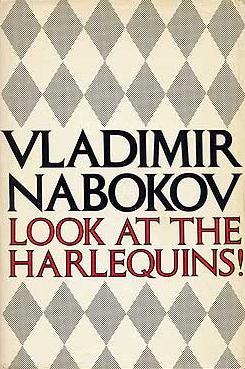
Look at the Harlequins! is a novel written by Vladimir Nabokov, first published in 1974. The work was Nabokov's final published novel before his death in 1977.
The Philadelphia poison ring was a murder for hire gang led by Italian immigrant cousins, Herman and Paul Petrillo, in 1930s Philadelphia, where the Italian community had more than doubled in 20 years from 76,734 in 1910 to over 155,000 by 1930 - just before the murder ring began operations. The activities of the ring came to light in 1938 and the cousins were ultimately convicted of first degree murder and executed by electric chair in 1941.
"The Aurelian" is a short story first written in Russian as Pil'gram by Vladimir Nabokov during his exile in Berlin in 1930. After translation by Nabokov and Peter Pertzov it was published in English in The Atlantic Monthly in 1941. The Aurelian is included in Nine Stories and Nabokov's Dozen.

The Enchanter is a novella written by Vladimir Nabokov in Paris in 1939. As Волшебник (Volshebnik) it was his last work of fiction written in Russian. Nabokov never published it during his lifetime. After his death, his son Dmitri translated the novella into English in 1986 and it was published the following year. Its original Russian version became available in 1991. The story deals with the hebephilia of the protagonist and thus is linked to and presages the Lolita theme.
"Bachmann" is a short story written in Russian by Vladimir Nabokov under his pen name, Vladimir Sirin, in Berlin in 1924. The story details a three-year love affair between the titular Bachmann, a celebrated pianist, and Mme. Perov, a married woman.

Lolita is a 1955 novel written by Russian-American novelist Vladimir Nabokov that addresses the controversial subject of hebephilia. The protagonist is a French literature professor who moves to New England and writes under the pseudonym Humbert Humbert. He describes his obsession with a 12-year-old "nymphet", Dolores Haze, whom he kidnaps and sexually abuses after becoming her stepfather. Privately, he calls her "Lolita", the Spanish diminutive for Dolores. The novel was originally written in English, but fear of censorship in the U.S. and Britain led to it being first published in Paris, France, in 1955 by Olympia Press.
The Passenger is a short story by Russian American author Vladimir Nabokov originally published in Russian in 1927.
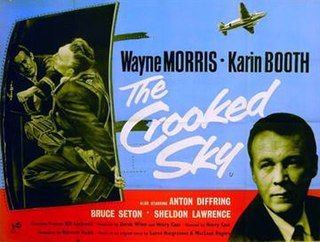
The Crooked Sky is a low budget 1957 black and white British melodrama/crime film, directed by Henry Cass from a story by Maclean Rogers and Charles F. Vetter. The film stars Wayne Morris, Anton Diffring and Karin Booth.
"That in Aleppo Once..." is a short story written by Russian-born author Vladimir Nabokov (1899–1977). First published in Atlantic Monthly in 1943, the story takes epistolary form, with an unnamed narrator describing his recollections of himself and his wife's deteriorating relationship while fleeing German occupation during Case Anton. The narrator reveals to his correspondent the likelihood his wife was not real, examining this premise during the account of events.
References
- ↑ Petty, Chapel Louise (1979). "A Comparison of Hawthorne's "Wakefield" and Nabokov's "the Leonardo": Narrative Commentary and the Struggle of the Literary Artist". Modern Fiction Studies. 25 (3): 499–507. ISSN 0026-7724. JSTOR 26282315.
- ↑ Galef, David (2000). "Nabokov in Fat City". Nabokov Studies. 6 (1): 51–56. doi:10.1353/nab.2011.0059. ISSN 1548-9965.